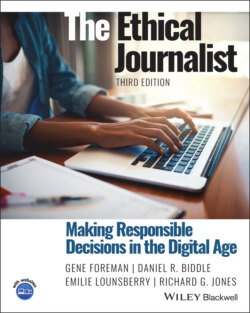Читать книгу The Ethical Journalist - Gene Foreman - Страница 65
Case Study: “I Don’t Want to Be a Part of the Story, at All” Protester Is Beaten; Reporter Steps In
ОглавлениеTENSION FILLED THE STREETS of Berkeley, California, on the sunny afternoon of August 27, 2017. Far-right demonstrators leaving a “No to Marxism in America” rally waded into a sea of counterdemonstrators, many clad in black and hoisting banners or shields.
Al Letson, host of the news outlet Reveal/CIR, was doing his job. Headset on and a satchel of recording equipment strapped across his back, he strode through the crowd videotaping the scene.
Then he saw a balding man in an American flag T-shirt tumble to the pavement.
Five counterdemonstrators surrounded the man – but not to help. They punched and kicked him as he lay curled in a ball. Letson saw someone strike him “really hard” with a flagpole. “I thought they were going to kill him,” Letson said.
Police were blocks away. No one was intervening.
Letson made a split-second decision.
Video shows Letson leaping atop the man, arms outstretched, and shouting to attackers to stop. The footage is dramatic: a wiry Black man in a red shirt and dreadlocks spreadeagled on a fallen white man, protecting him from blows.
The man was Keith Campbell, 54, a right-winger known for videotaping left-wingers’ demonstrations. He said he suffered broken ribs and bruises to his kidneys, back and head that day. “I thought, this is it. I’m going to die,” he said later when he was interviewed for a Reveal podcast. In the podcast, Campbell told Letson: “I owe you my life.”
Letson told NPR, “I don’t want to be a part of the story, at all. And I believe in all of those journalistic ethics and all of that – but I also think that, before that, I’m a human being.”
Letson is a multimedia journalist whose work has won Edward R. Murrow and Peabody awards. “Remember,” his Reveal podcast signoff goes, “there’s always more to the story.”
This time, Letson was the story.
NPR and Columbia Journalism Review reported on his actions. So did Tucker Carlson, who told his Fox News audience that Campbell had been rescued from Antifa by “a lefty journalist, really.”
Reveal’s journalists work under strict ethics guidelines. Staffers for the Bay Area-based news outlet can’t take sides, can’t support causes, and can’t hype their videos (“Music should not be used to manipulate the emotions of the viewer”).
“Our editorial policy is clear: we are unbiased observers, not participants,” then-editor in chief Amy Pyle said in Reveal’s own story on the Berkeley incident. “However, in reviewing the video, it is clear that Al did not take sides. Instead, he responded as any of us might if we saw another human in distress.”
Reveal not only reported on the episode but kept reporting afterward on how the assault on Campbell occurred. In a podcast weeks later, Letson interviewed an Antifa activist known as “Dominic” who took credit for targeting Keith Campbell and others on a “Know Your Nazi” list. Dominic told Letson, “The only regret I have is that I didn’t pull you off so we could finish on him.”
On Fox, Campbell told Carlson that Letson “dove in rather than, you know, standing back and doing the journalistic thing. I mean, he saved my life.”
“Well,” Carlson said. “God bless him.”
Sources
“Tucker Carlson Tonight,” Fox News, “Trump supporter recounts beating by Antifa group,” Aug. 30, 2017. Viewed on YouTube on Sept. 25, 2020.
Meg Dalton, “A reporter never wanted to become the story. But a life was in danger,” Columbia Journalism Review, Aug. 30, 2017.
Kelly McEvers, “I Saw His Humanity: ‘Reveal’ Host on Protecting Right-Wing Protester,” NPR’s “All Things Considered,” Aug. 28, 2017.
Reveal/CIR, “Ethics Guide,” https://www.revealnews.org/ethics-guide/
M. Scott Mahaskey, “The rise of Antifa,” Politico, Dec. 26, 2017.
Reveal/CIR, “Reveal host Al Letson shields man from beating at anti-hate rally,” Aug. 27, 2017.
Reveal/CIR, “Street fight: A new wave of political violence,” podcast, Sept. 23, 2017. https://revealnews.org/episodes/street-fight-a-new-wave-of-political-violence
Al Letson, via Skype in a class discussion, University of Delaware, Oct. 3, 2017.
Questions for Class Discussion
What factors should a journalist consider when deciding whether to intervene as Al Letson did? What would you have done in this situation?
Consider how the story might have played out if Letson had not intervened. To what extent did his action change the story? A little? A lot?
Consider Letson’s comment, “I believe in all of those journalistic ethics and all of that – but I also think that, before that, I’m a human being.” Would journalistic ethics really bar him from intervening in this case?
Letson had to make a split-second decision. But by 2020, clashes like the one he covered in 2017 had all but become a regular feature of US street protests. What steps can journalists covering those events take in advance to guide their actions if violence occurs? Make a list.
